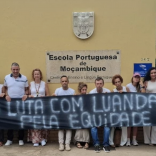Teachers at the Portuguese School of Mozambique threaten to strike over salary disparities
Hidden debts trial: 19 November 2021 – AIM report

Screen grab: Youtube
- Bank of Mozambique officials browbeaten into signing legal authorisations
The Maputo City Court on Thursday night heard how government officials in 2013 browbeat the Bank of Mozambique into approving loans from the European bank Credit Suisse to Proindicus, the first of three fraudulent, security-linked companies which eventually obtained over two billion dollars in loans from Credit Suisse and the Russian bank, VTB.
The central bank has the duty to authorise foreign loans to private entities – and, although their shareholders are public bodies, Proindicus and its sister companies, Ematum (Mozambique Tuna Company) and MAM (Mozambique Asset Management, are classified as private companies.
So the loans from Credit Suisse and VTB required central bank authorisation. But there was a catch: a clause in the foreign exchange law states that the Bank of Mozambique may not authorise foreign loans to private bodies that will be repaid through state guarantees.
The government of the day, under former President Armando Guebuza, issued guarantees covering every cent of the loans (smashing through the ceiling on loan guarantees established in the 2013 and 2014 budget laws).
One of the central bank managers who handled the Proindicus loan, Elsa Chambale, told the court that she and her colleagues knew they had no power to authorise the loan, but they did so anyway because they had been told that matters of “national security” were involved.
She said that, in 2013, she had received a call from her director, Silvina de Abreu, who had been given instructions to receive “somebody from the Defence Ministry or the security service” to discuss a foreign loan, and the matter was top secret.
The “somebody” turned out to be Eugenio Matlaba, the defence ministry official who became chairperson of Proindicus. He told Chambale that Proindicus was handling a project for coastal security, and showed her the terms of a contract already signed by Proindicus, the Ministry of Finance, and the Abu Dhabi based group Privinvest, which was the sole supplier of equipment to Proindicus.
Matlaba had a dossier containing, among other documents, the Proindicus statutes, the financial contract, a letter explaining the purpose of the project, and the state guarantee signed by the then Finance Minister Manuel Chang. He stressed that the project was highly confidential, and extremely urgent. He said it was a joint project between the defence and interior ministries, and the security service, SISE.
Matlaba expected Chambal to fill out and sign a form authorising the Credit Suisse loan – but she thought the matter should be analysed by her colleagues and superiors, although personally she saw no objection to signing the authorization.
Chambal said she was aware that the law forbade the central bank from making such authorisations. However, since Chang himself was demanding the authorisation “I believed he must have found a norm which established that authority. Although I did not know of one”, said Chambal.
A couple of days later, she receive a phone call from the then National Director of the Treasury, Isaltina Lucas, who asked if she had received the documents from Matlaba. Chambal replied that she was still analysing them.
An angry Lucas told her “there was nothing to analyse because everything had already been signed. She told me I was playing around with serious matters, and that we should just issue the letter of authorization. It was urgent because it was a matter of defence and security”.
The phone call worked, and the letter of authorisation wound its way up the central bank hierarchy – from Chambal’s office, to Silvina de Abreu, to board member Waldemar de Sousa, and finally to the governor of the bank himself, Ernesto Gove. At every stage the illegal authorisation was rubber-stamped.
The tactics employed by Matlaba and Lucas worked. “We were convinced there was a security problem that needed to be solved”, said Chambal.
The initial Credit Suisse loan to Proindicus was for 372 million US dollars – but Privinvest wanted to sell more equipment to Proindicus, and so the company was soon knocking on the central bank’s door again, asking for authorization to increase the loan by 250 million dollars, bringing the total to 622 million.
Once again the Bank of Mozambique officials broke the law and gave the authorisation, accepting the flimsy argument that Proindicus needed more equipment.
Although at the time nobody could have known that the Credit Suisse managers negotiating the loan (Andrew Pearse, Detelina Subeva and Surjan Singh) had cooked up a massive scheme for bribes and kickbacks with Privinvest official Jean Boustani, Chambal and her colleagues must have realised that something very unusual was going on. But nobody blew the whistle on the scheme.
Chambal said “We were very worried by the guarantees that were being issued” – so much so, that the Deputy Governor of the central bank, Antonio Pinto de Abreu, came to the rescue, by insisting that any future authorisations must be requested by Chang himself. This was why Chambal was not involved in the Ematum or MAM loans.
Asked by prosecutor Sheila Marrengula if she had read the contract between Credit Suisse and Proindicus, she said she had – but when Marrengula noted that the contract makes Bank of Mozambique auhorisation a prior condition for the Credit Suisse loan, she said “I don’t remember that”.












Leave a Reply
Be the First to Comment!
You must be logged in to post a comment.
You must be logged in to post a comment.